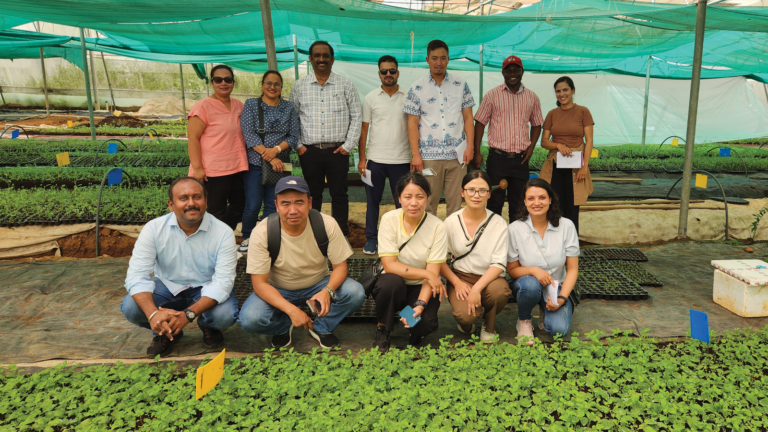 In the mountainous regions of Nepal and Bhutan, where challenging terrain and unique climate conditions prevail, the potato has emerged as a vital crop, contributing significantly to food security, farmer livelihoods, and economic stability. In Bhutan, potatoes play a crucial role in domestic and export markets. Over 22% of farming households in Bhutan rely on potato cultivation, producing nearly 38,000 metric tons annually, with a sizable portion exported to neighboring countries. Meanwhile, potatoes are Nepal’s fourth most important crop after rice, maize, and wheat, contributing over 6% to agricultural GDP. The nation has seen a steady increase in potato consumption, underscoring the crop’s importance in high-altitude regions where it provides a staple source of nutrition. With yields currently around 10-17 tons per hectare, Nepal has the potential to double its productivity, highlighting the need for new varieties and improved farming practices.
In the mountainous regions of Nepal and Bhutan, where challenging terrain and unique climate conditions prevail, the potato has emerged as a vital crop, contributing significantly to food security, farmer livelihoods, and economic stability. In Bhutan, potatoes play a crucial role in domestic and export markets. Over 22% of farming households in Bhutan rely on potato cultivation, producing nearly 38,000 metric tons annually, with a sizable portion exported to neighboring countries. Meanwhile, potatoes are Nepal’s fourth most important crop after rice, maize, and wheat, contributing over 6% to agricultural GDP. The nation has seen a steady increase in potato consumption, underscoring the crop’s importance in high-altitude regions where it provides a staple source of nutrition. With yields currently around 10-17 tons per hectare, Nepal has the potential to double its productivity, highlighting the need for new varieties and improved farming practices.
The International Potato Center (CIP) is driving an initiative to enhance potato production capacity by training scientists from these countries in innovative seed production and quality assurance technologies. This is aimed at equipping their National Potato Program technical teams with the tools they need to increase the efficiency and quality of seed production, helping farmers access resilient and productive varieties more quickly.
Recently, CIP organized a training in Bangalore, India, with four participants each from Bhutan (2 male and 2 female) and Nepal (3 female and 1 male). The three-day training focused on early-generation seed production using the rooted apical cuttings (RAC) technology and potato disease diagnostics using the Loop-Mediated Isothermal Amplification (LAMP) assay technology. The RAC technology allows for rapidly multiplying new potato varieties by cultivating young cuttings from potato plants. This method significantly reduces the time required for seed production and minimizes the crop’s exposure to soil-borne diseases, resulting in healthier, more affordable seed potatoes for farmers. The technology has been tested and adapted to different contexts in developing countries. LAMP assay, on the other hand, is a validated diagnostic tool that quickly detects plant pathogens—helping safeguard crop health from the start.
The training was led by Dr. Kalpana Sharma, with expert support from Mr. Ravindranath Reddy and Mr. Elly Atieno. On the first day, participants were introduced to the theoretical principles of the RAC technology. The second day focused on hands-on field training, where participants practiced the techniques essential to RAC production. On the third day, participants received practical training in the field deployment of LAMP assay technology. They were joined by students from the University of Horticultural Sciences Bagalkot, India, who were also eager to learn about the technology.
With this initiative, CIP is helping scientists and agricultural experts from India, Nepal and Bhutan build robust, efficient seed systems that can support local farmers, boost crop productivity, and meet rising potato demand. Through enhanced seed systems, farmers in these countries are better equipped to grow high-yield, disease-resistant potatoes that support food security, economic growth, and the sustainable development of their rural communities.

